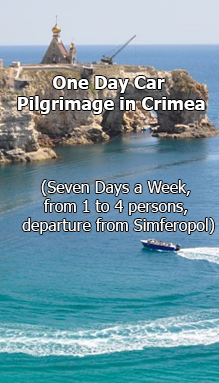Balaklava
Balaklava (Fish Nest) was a town before 1957. Now it is one of the districts of Sevastopol 12 km far from the center of the city. Beautiful Balaklava is situated in a small cozy bay. It is about 3000 years old. Homer described the bay in his “Odyssey”:
“For six days and nights they had been riding the waves, and on the seventh one they entered a glorious harbour”.
The Tauri had the temple of their goddess on Cape Phiolent. The ancient Greeks settled here in 422 called it Syumbolon Limpe (Harbour of Signs).
In 14th century Syumbolon was conquered by the Genoese who called it Chembalo. Balaklava became the west advanced post of the Genoese colonization. Many watching towers were built. The biggest is the Tower-Donjon. In 1357 a Christian church of the Twelve Apostles was built. It is the oldest building in Balaklava nowadays.
The local Tatar inhabitants called the settling Balyk-Kaya (Fish Cliff) (as Afanasiy Nikitin d. 1472) wrote in his book “Traveling Over The Three Seas”. In 1475 the town fell to the Turks. Under the Turks Balaklava became a shipbuilding centre, in the XVIII century the town fell into neglect.
In 1820 A. S. Pushkin on his way from Gurzuf to Bakhchisaray visited Cape Phiolent and the monastery of St. George. It was here that those poetic lines were born “To Chaadayev”.
During the Crimean war the battle ships of the British Navy based in Balaklava bay. English squadron came up to Balaklava on October 14, 1854. It was met by the gun fire from the fortress. The English built an embankment and the first Crimean railway in February 1855. After the war the railway was sold to Turkey. At night on November 24, 1854 during unusual storm many of the British battleships sank at Balaklava. The famous frigate “Black Prince” with the treasures aboard became a popular legend.
Not very far from Balaklava the famous Battle of Balaklava took place on October 1854. The British and French fought against the Russians. The English poet Tennyson (1809–92) wrote a poem about this battle. The name of Balaklava entered the English history and language: there is Balaklava Street in London, and a Balaklava helmet.












